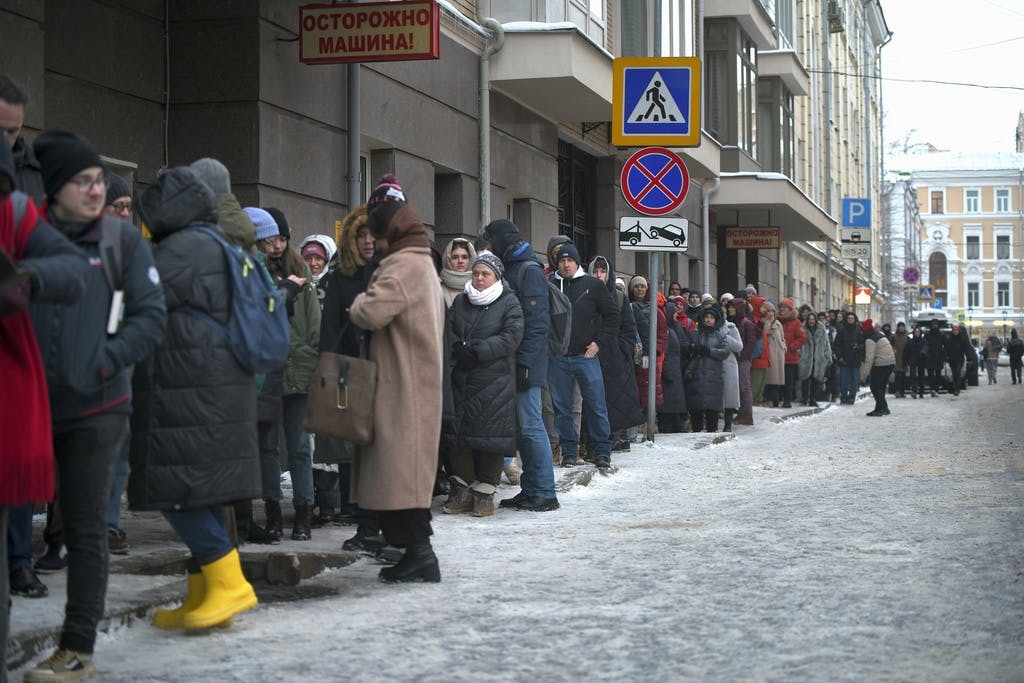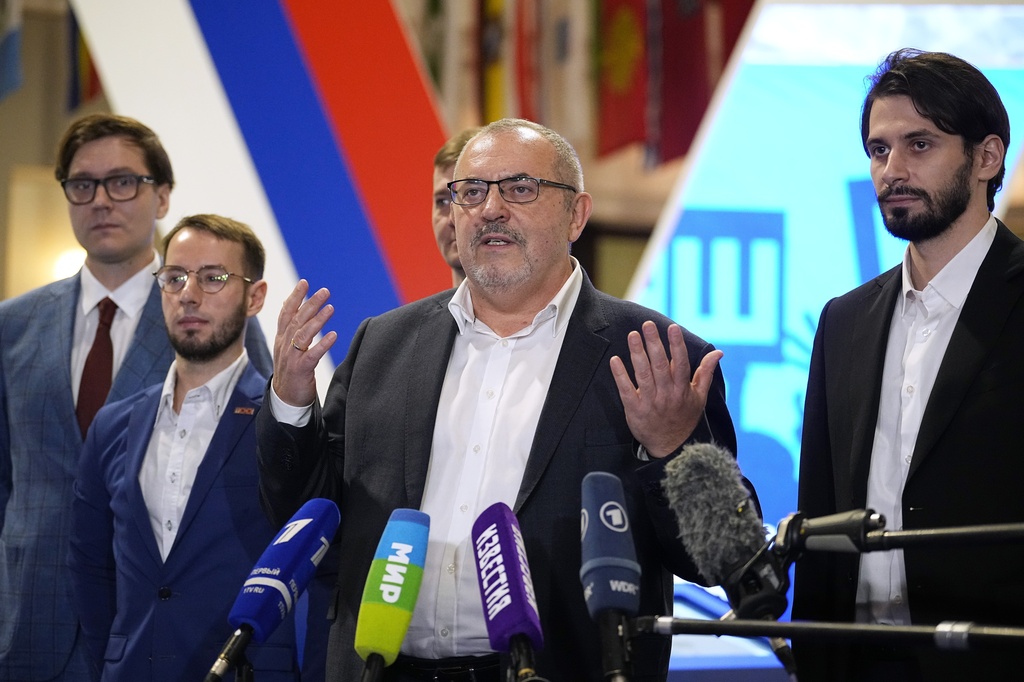In Russia’s Presidential Election, Something Goes Off Script
Anti-war candidate Boris Nadezhdin catches the winter mood as Putin fights to keep power.

Updated at 8:40 a.m. E.D.T.
In President Putin’s relaxed stroll to reelection to a fifth term, something has gone off script. In the dead of winter, thousands of people stood outside in lines to sign petitions to place on the ballot a politician largely known for calling Russia’s invasion of Ukraine a “mistake.”
On Wednesday, the candidate, Boris Nadezhdin, submitted 105,000 signatures — spanning the country between Siberia and St. Petersburg — for review by the Central Election Commission election at Moscow. In a message posted on his Telegram channel, he wrote: “This is my pride. The work of thousands of people going without sleep over many days. The result of the queues you stood in, in the cold, is in the boxes. It will be very difficult for the CEC and the authorities to say: ‘I didn’t notice the elephant in the room!’
Last month, officials rejected on a technicality the only other anti-war Presidential candidate. This too may be the fate of Mr. Nadezhdin, a portly, 60-year-old Moscow region city councilor, whose previous claim to fame was his role as the liberal fall guy for right wing ranters on state TV.
However, what cannot be undone are the widely distributed photos of petitioners waiting in lines that stretch city blocks. With over 100,000 people signing their names and giving their passport numbers, these gatherings constitute Russia’s largest anti-war demonstrations since Mr. Putin launched his invasion of Ukraine almost two years ago.

There is no serious doubt that Mr. Putin will win the election in Russia. It takes place in mid-March. The president controls Russian TV, radio, and websites. By injecting billions of dollars into military spending, Mr. Putin has reduced Russia’s unemployment to three percent, a post-Soviet low.
On Monday, the International Monetary Fund raised its growth forecast for Russia in 2024 to 2.4 percent, slightly above the forecast of 2.1 percent for America. Critics say these economic numbers reflect the failure of the West’s sanctions to curb Russia’s war against Ukraine.
Yet as the quiet sidewalk lines show in recent days, not everyone wants to see Mr. Putin win another six-year term. During the Christmas season, Russia pounded Ukraine with missiles in an ultimately unsuccessful attempt to freeze Ukrainians in the dark. At home, though, an estimated one quarter of the 8.5 million inhabitants of Mr. Nadezhdin’s native Moscow region suffered prolonged power and heating outages.
With Soviet-era central hot water heating systems failing in cities across Russia, as many as 1,000 people have frozen to death. Mr. Nadezhdin and other critics blame this crisis on deferred maintenance due to a doubling of spending on the military.
“Cities are freezing. Who is guilty?” Mr. Nadezhdin asked in a Telegram post. “The huge amounts of money that have been spent and planned for the special military operation could have been invested in improving the quality of life of my fellow citizens.”
Equally damaging for Russia’s president, Russian state propaganda increasingly falls on deaf ears. Last month, for the first time ever, Russians said they rely more on the Internet than on TV for their news, according to a new poll by the state-owned Russian Public Opinion Research Center. For 44 percent of respondents, Internet was their chief source of news, compared to 40 percent who said television.
Russian television news shows, which during the war have been increasingly hysterical, have taken a big credibility hit. Seven years ago, 46 percent of poll respondents said Russian TV provided “objective information.” By last month, that portion had dwindled to 26 percent.
To control information since the invasion began in February 2022, Russian authorities have blocked or removed about 138,000 websites. In response, Russia became the top country worldwide for downloading virtual private networks, which allow users to anonymously get around Internet access restrictions. Today, one quarter of all Russian adults use such private networks, up from nine percent before the war.
As a result, fewer Russians seem to back Mr. Putin, who is campaigning on a pro-war, anti-West platform. Far from pushing the war out of sight, the president has been seen this month on TV meeting with wounded soldiers, with active duty soldiers, and with parents of soldiers killed in the war.
Asked last month for their top wish for 2024, half of Russians polled in December by Russian Field chose “peaceful skies and the end of the special military operations”— the Kremlin’s code word for the war. Only six percent of respondents chose Russia’s “victory.” In October, a Moscow-based opposition group, Chronicles, found that only 12 percent of respondents supported the war, down from 22 percent last February.
Separately, an October poll by Russia’s leading independent polling group, the Levada Center, finds that 70 percent of Russians would support Mr. Putin if he decided to end the conflict that week. In an Atlantic Council essay “How Strong Is Russian Public Support for the Invasion of Ukraine?” exiled Russia politician Vladimir Milov writes: “Russian public is actually more concerned with how soon the war will end.”
Tapping into this mood comes Mr. Nadezhdin, whose surname coincidentally shares the Russian root word for hope. Blacklisted by Russian TV, he has done a series of live-streamed interviews this month that regularly draw over 100,000 views.
“From the very beginning I opposed the ‘special military operation’ and said that this was a fatal mistake and a catastrophic decision,” Mr. Naezhdin tells Current Time TV, a station created by Radio Free Europe and Voice of America.
When not brought down by hackers, the candidate’s website declares him to be a “principled opponent of the policies of the current president.” He says Mr. Putin “sees the world from the past and is dragging Russia into the past.”
Mr. Naezhdin promises to release all political prisoners and to abolish Russia’s anti-gay laws, which he calls “idiotic.” Opposing Mr. Putin’s war on the west, he worries that Russia is falling into China’s embrace. He says: “Normal relations with Europe are obviously inevitable for us.”
Tolerance of rivals is not a hallmark of Mr. Putin, a former KGB officer who is determined to stay in the Kremlin longer than Joseph Stalin. Russia’s leading opposition leader, Alexei Navalny, is serving a 30-year sentence in an Arctic prison camp. An oil magnate with political ambitions, Mikhail Khodorkovsky, is in exile after serving a decade in prison. A former political ally of Mr. Nadezhdin, Boris Nemtsov, was shot dead on a Moscow River bridge in front of Kremlin.
This month, political scientist Ekaterina Schulmann asked Mr. Nadezhdin if he is concerned about his future. “The most delicious and sweet years of my life are already in the past,” Mr. Nadezhdin says in a YouTube video that has been watched by 984,000 people. “I’m ready for anything.”
___________
Correction: Soviet-era hot water heating systems have been failing across Russia, leading to many deaths. An earlier version misstated the source of heat.

